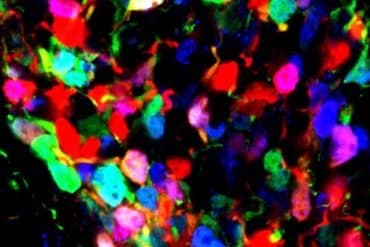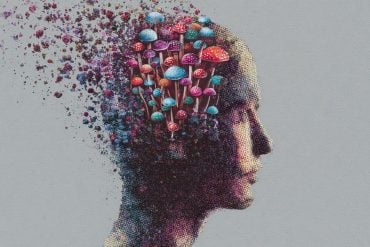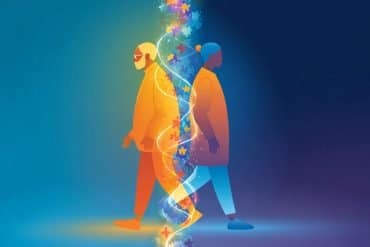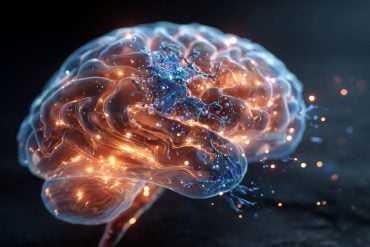Summary: Musicians and musically active people tend to have a higher genetic risk factor for bipolar disorder and depression, a new study reports.
Source: Max Planck Institute
Intuitively, people commonly believe that making music is good for their mental health. Music therapies also rely on a positive influence of music on mental health problems.
However, compared to musically inactive people, musicians more often seem to suffer from depression and anxiety disorders. How can this be explained?
An international research team involving the Max Planck Institute for Empirical Aesthetics (MPIEA) in Frankfurt am Main, Germany, examined the relationship between making music and mental health in detail and found that musically active people have, on average, a slightly higher genetic risk for depression and bipolar disorder.
Making music and mental health problems: A reciprocal relationship?
In a large population study, the scientists were able to demonstrate a link between musical engagement and mental health problems for the first time in 2019. About 10,500 Swedish participants provided information about both their musical engagement and their mental health.
In addition, the data was linked to the Swedish Patient Register so that psychiatric diagnoses could also be evaluated. It was found that musically active participants reported more frequent depressive, burnout, and psychotic symptoms than participants who did not make music.
Those results were published in the open-access journal Scientific Reports in 2019.
Since the study participants were twins, the research team was able to account for familial influences. These influences include both genes and the family environment during childhood. Twins usually grow up at the same time in the same household. Moreover, they have completely or at least partially the same genes—depending on whether they are monozygotic or dizygotic twins.
The team found that musical engagement, as in playing an instrument or singing, and mental health problems are likely not causally related. “In other words, people do not make music in response to their mental health problems or vice versa,” explains first author Laura Wesseldijk from the MPIEA. “Rather, the link can be attributed to shared genetic factors and influences from the family environment.”
The genetic relationship between musical engagement and mental health
The scientists then continued their investigation into the relationship between musical engagement and mental health using molecular genetics methods. They confirmed that genetic variants that influence mental health problems and those that influence musical engagement overlap to some extent.
The results of this second study were recently published in the open-access journal Translational Psychiatry.
The team examined the genetic link between making music and mental health using DNA from 5,648 individuals. In addition to genotype data, the study participants provided information about their musical engagement, their creative and athletic achievements, and their mental health.
Based on the available information, individual indicators—so-called “polygenic scores”—could be calculated for the genetic risk of the participants for mental illnesses as well as their genetic predisposition for musicality.
Analysis of the data showed that individuals with a higher genetic risk for depression and bipolar disorder were, on average, more often musically active, practiced more, and performed at a higher artistic level. Interestingly, these associations occurred regardless of whether the individuals actually experienced mental health problems or not.
At the same time, participants with a higher genetic predisposition for musicality also had, on average, a slightly higher risk of developing depression—regardless of whether or not they actually played an instrument. These findings lend further support for the notion that partially the same genes influence musical engagement and mental health.

“The overall relationship between making music and mental health is thus very complex: familial and genetic factors can influence both musicality and mental health. Furthermore, musicians appear to have a slightly higher genetic risk for certain mental illnesses,” says Miriam Mosing of the MPIEA, senior author of both studies.
Of course, these results do not exclude the possibility of positive influences of making music on mental health. Musical engagement may well have a positive or even therapeutic effect.
The team is already conducting further research in this area, also taking into account flow experiences. “Flow” refers to the experience of complete absorption in an activity, also experienced for example during cultural activities, such as playing a musical instrument.
Initial results show that flow experiences can have a positive influence on mental health—even when familial and genetic factors are taken into account.
About this music, genetics, and mental health research news
Author: Press Office
Source: Max Planck Institute
Contact: Press Office – Max Planck Institute
Image: The image is in the public domain
Original Research: Open access.
“A comprehensive investigation into the genetic relationship between music engagement and mental health” by Laura W. Wesseldijk et al. Translational Psychiatry
Abstract
A comprehensive investigation into the genetic relationship between music engagement and mental health
While music engagement is often regarded as beneficial for mental health, some studies report higher risk for depression and anxiety among musicians.
This study investigates whether shared underlying genetic influences (genetic pleiotropy) or gene-environment interaction could be at play in the music-mental health association using measured genotypes.
In 5,648 Swedish twins with information on music and sport engagement, creative achievements, self-reported mental health and psychiatric diagnoses based on nationwide patient registries, we derived polygenic scores for major depression, bipolar disorder, schizophrenia, neuroticism, sensitivity to environmental stress, depressive symptoms and general musicality.
In line with phenotypic associations, individuals with higher polygenic scores for major depression and bipolar disorder were more likely to play music, practice more music and reach higher levels of general artistic achievements, while a higher genetic propensity for general musicality was marginally associated with a higher risk for a depression diagnosis.
Importantly, polygenic scores for major depression and bipolar remained associated with music engagement when excluding individuals who experienced psychiatric symptoms, just as a genetic propensity for general musicality predicted a depression diagnosis regardless of whether and how much individuals played music.
In addition, we found no evidence for gene-environment interaction: the phenotypic association between music engagement and mental health outcomes did not differ for individuals with different genetic vulnerability for mental health problems.
Altogether, our findings suggest that mental health problems observed in musically active individuals are partly explained by a pre-existing genetic risk for depression and bipolar disorder and likely reflect horizontal pleiotropy (when one gene influences multiple traits), rather than causal influences of mental health on music engagement, or vice versa (referred to as vertical pleiotropy).







